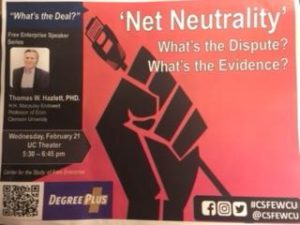When on the internet, you expect to have access to whatever website you want with generally fast speeds. What you are expecting is Net Neutrality.
Net Neutrality essentially sustains an open internet.
However, Thomas Hazlett, a professor of economics at Clemson University, disagrees.
Hazlett described how Net Neutrality stifles competition and innovation in the marketplace during a Free Enterprise Speaker Series at 5:30 p.m. on Wednesday, Feb. 21 in the UC theater.
The Center for the Study of Free Enterprise (CSFE) strives to provide students with research and thoughts about economic issues in our region.
The CSFE sponsors the Free Enterprise Speaker Series that explores the various points on issues of today through civil discourse.
For this speaker, the theater was packed as students, faculty and staff alike filled the seats to listen to Hazlett’s take on Net Neutrality.
Net Neutrality has a complicated history.
For a detailed look at Net Neutrality’s history check out the timeline below from Public Knowledge.
Most recently, changes in Net Neutrality regulations have brought attention back to the controversial topic.
On Dec. 14, 2017, the Federal Communication Commission (FCC) voted in favor of Chairmen Ajit Pai’s plan to remove Network Neutrality protections. This means taking away Title II of the Communications Act, which served as the basis for Net Neutrality rules.
For those that oppose Pai’s plan, there are some major concerns.
Without Title II, the FCC lost its authority over internet service providers (ISPs) like Verizon and Comcast. As a result, these ISPs and others will be able to restrict and control content as they see fit.
As a result of removing Net Neutrality protections, internet users now face some serious problems.
First, ISPs no longer have to treat all internet traffic equally.

The flyer for the Free Enterprise Speaker Series. Photo by Keegan Wiggins.
For example, an ISP could slow down internet speeds to websites that they don’t like or agree with, effectively hurting that site and preventing users from accessing that information. This would give ISPs the power to control content availability.
Next, ISPs could form deals or partnerships with organizations like Google where they would slow down the speeds of any Google competitor in return for money.
During his presentation, Hazlett argued that Net Neutrality would actually hurt user experience.
For example, Hazlett argued that Title II regulations are anti-innovation, anti- investment and ultimately, anti-competitive.
As a result, ISPs wouldn’t be able to make better deals for consumers because Net Neutrality regulations would define them as discriminatory.
Without Net Neutrality, companies are able to grow.
For example, Netflix experienced vertical growth by producing their own movies and series when they previously only provided an outlet for users to stream movies and series by other productions.
Hazlett argues that Net Neutrality would limit companies’ capacity for growth.
During his presentation, Hazlett played a video from the Wall Street Journal that broke down Net Neutrality.
While the video below opposed his stance on Net Neutrality, it provides a good analogy for the issue an internet without Net Neutrality could pose. The Wall Street Journal provides some background information about Net Neutrality and when the FCC adopted Net Neutrality on Feb. 26, 2015. To see the full article, click here.
After his presentation, I was able to talk to with Hazlett about his stance on Net Neutrality.
Do you think the recent changes in Net Neutrality regulations was predictable?
The undoing under the Trump FCC of the Obama FCC regulations was not a surprise to the marketplace because certainly the appointment of Ajit Pai as the chairman of the FCC signaled that we were going to go in that direction. Ajit Pai had voted against the Net Neutrality rules in 2015, so I think it is expected.
Do you think that Net Neutrality regulations have a strong chance of coming back?
Well certainly, we, over the last decade, have gone back and forth at least three full circles and it could certainly go in a fourth iteration if there’s a democratic president elected in 2020 and new members of the FCC. So, we can keep going back and forth. It is amazing that it has stuck around so long as a sort of public policy ping pong ball. It’s not impossible that that could happen.
What advice do you have for someone who is worried about Net Neutrality?
Like anything else, they should study up and do their best to come to their own conclusion if they have a different understanding or basis for action. I would certainly encourage people to read the arguments that have been traveling back and forth so to speak. Proponents and opponents of the regulation to get that larger sweep of history. There has been a movement away from the regulated common carrier rules that have been extremely successful in opening up competition with different business models and new technologies. I think that will tell the story in a powerful way.

Dr. Thomas Hazlitt presenting about the danger Net Neutrality presents for the marketplace. Photo by Keegan Wiggins.
Who do you think have the most to lose with Net Neutrality regulations?
Well, the conventional wisdom is that the carriers are going to be the ones, meaning the cable operators and the telephone companies, but they provide internet access because they are directly regulated. It tends to be the wireless operators and even the smaller operators like T-Mobile competing with Verizon and AT&T. They have been challenged in their business model under Net Neutrality rules, particularly on their binge on program, and they are a very innovative company that comes up with different ways to give customers a better experience for the internet. They actually do run afoul of the Net Neutrality rules because they favor their own content. That’s what binge on is. If the content whether it be video or music or some applications, if they are on the approved list and they agree to have their data rates fairly slow, so that they don’t congest the network then they get to have unlimited usage by the customer. Well, that, according to the FCC under Net Neutrality rules, is a violation. So, companies like that are trying to get more market share and offering customers, in some cases, the better deal are going to be hurt. A damage to competition is clear.
In contrast, who do you think have the most to lose without Net Neutrality regulations?
I don’t see a big downside without Net Neutrality. There are certainly champions of Net Neutrality that say that innovators will have trouble in the market, but look at the great innovations going back 25 years in the mass market internet. The Googles and the Netflixs and the Amazons they’ve gone into the market without Net Neutrality regulations, so I see it as a very good robust environment for innovation on the edge as well as good economic incentives for the core network builders to expand their capacity and service their customers better. I’m very optimistic about how the marketplace can accommodate.
If you are concerned about Net Neutrality and don’t want to see it go, click here to write to Congress.



